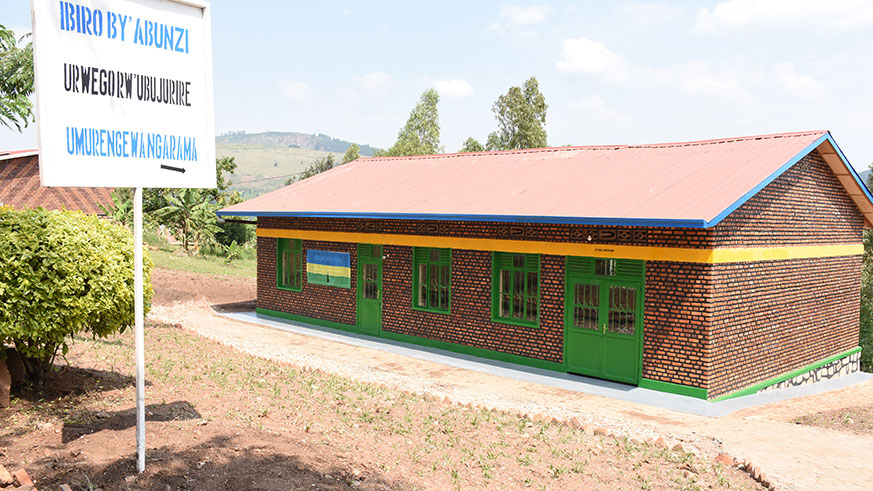The facility, the first Abunzi office building in the country, was inaugurated Wednesday.


It has been 15 years since community mediators, known as ‘Abunzi’, were officially integrated in Rwanda’s justice system, and studies have shown that their role in settling disputes is appreciated by citizens.
Nonetheless, these grassroots-level tribunals lack offices.
It is against that background that residents of Ngarama Sector in Gatsibo District decided to build an office block for their own Abunzi (mediators’) committees.
The Rwf18.2 million office was largely constructed through the monthly Umuganda exercise.
The facility, the first Abunzi office building in the country, was inaugurated Wednesday.
Speaking during the inauguration, the Minister for Justice, Johnston Busingye called on other regions around the country to borrow a leaf from Ngarama.
The grassroots mediation mechanism plays a central role in delivery of justice, handling most of the disputers at the community level.
The Abunzi have two levels, the ‘tribunals’ of first instance at the cell level and the appeals committee at the sector level. Few cases have been to conventional courts from the Abunzi.
"This is a good example for the rest of the country,” he said.
Busingye, who is also the Attorney General, said that residents building offices for their local mediators means they appreciate the importance of the Abunzi.
Ngarama has 42 mediators, or Abunzi, who until recently dispense to justice under a large tree near the sector’s offices.
"What this sector did can be done by other sectors as well, and not only the sectors, cells can do it too,” said Busingye.
Abunzi are an important component of Rwanda’s governance systems, he said.
This community-level milestone means a lot to the country’s justice system, he said, "because one of the main attributes of a well-functioning justice system is a place to deliver justice from.”
Ngarama residents achieved this mainly because of good mentality, he added. "They sat and reasoned together and implemented what they agreed upon.”
Busingye said the same attitudes should characterise all Rwandans in whatever they do, whether in private or public domain, whether in rural or urban settings.
He said mediators handle some 70 per cent of cases that would otherwise have ended up in conventional courts, causing huge backlogs.
The minister said such facilities would allow Abunzi to embrace digitisation and properly document and follow up on cases. "They need to use computers and file their resolutions electronically, so that 20, 30 years from now someone can easily access these resolutions.”
He said even classic courts can refer to Abuzi decisions, but this can only be possible once they are well kept and easily accessible.
Otherwise, he said, parties who lost cases will be returning "10 years later and lodge the same cases as if they were never adjudicated.”
"We do not want the [mediators’] files to get lost or be destroyed by insects or rain,” he said.
How did residents realise it?
Fidele Kanyamihigo, resident who led the team in charge of funds mobilisation and construction of the Abunzi office, said locals decided to build the facility after they realised that lack of an office for Abunzi was hampering the latter’s services and affecting those seeking their mediation as well.
We took it upon ourselves to make it a priority, he said.
"We then elected a committee to coordinate our efforts to realise this goal,” said Kanyamihigo, who was elected to head the same committee.
Most of the contributions, he said, came through the monthly community exercise, best known as Umuganda. "Households also contributed money, from as little as Frw1000,” he said.
The Government gave them a plot of land on which to construct the office.
Gervais Mulisa, chair of Abunzi at the sector level, extended a word of appreciation to residents, saying that working under a tree presented many challenges.
"You have given us a chance to serve you with a level of comfort,” he said.
Inspired by this achievement, Gatsibo mayor Richard Gasana said they will sensitise the other 13 sectors of the district to follow in Ngarama’s footsteps and construct Abunzi offices too.
He praised Ngarama residents for leading by example in different areas, recalling that residents of the sector already constructed offices for cell administrations, a health centre, a police station, and now an office building for Abunzi.
"You truly understand the spirit of Umuganda (a Kinyarwanda term that means "working together for a common social cause”),” the district mayor added.
Gatsibo District has 582 mediators (Abunzi), 327 of whom are women. They operate from, 83 sites – 69 at the cell level and 14 at the sector level.
The Abunzi tribunals in the district received some 1,349 cases during the 209-20 fiscal year, 1,332 of which were settled, with the remaining 17 set to be resolved over the next few days, Gasana said


